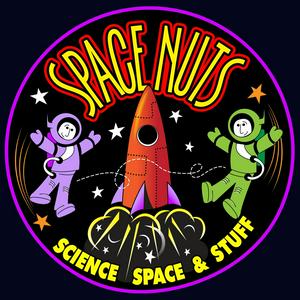Stellar Microbes, Titan's Mysteries & the Quest for Life Beyond Earth
This episode of Space Nuts is brought you with the support of Saily. If you love travelling, you need Saily by your side. To find out more and get the special Space Nuts listener discount, visit www.saily.com/spacenutspace Nuts Episode 513: Microbial Life in Space, Titan's Secrets, and the Search for Intermediate Black HolesIn this engaging episode of Space Nuts, host Heidi Campo returns with astronomer Professor Fred Watson to explore the intriguing intersection of microbiology and space exploration. From the mapping of microbes aboard the Tiangong Space Station to the potential for life beneath the icy crust of Titan, and the latest discoveries about intermediate black holes, this episode is a cosmic journey filled with fascinating insights.Episode Highlights:- Microbial Mapping on Tiangong: Heidi and Fred discuss the China Space Station Habitation Area Microbiome Program (CHAMP) and its efforts to map the microbial life aboard the Tiangong Space Station. They explore the implications of a sterile environment in space and how it might affect astronauts’ health upon their return to Earth.- Life on Titan: The conversation shifts to Titan, Saturn’s largest moon, where researchers are investigating the possibility of life in its sub-ice ocean. Fred explains how organic nutrients from Titan’s surface might migrate through its thick ice layer, and the challenges of sustaining microbial life in such a harsh environment.- Geothermal Activity and Microbial Life: The duo delves into the potential for geothermal activity on Titan and how it might support life. They discuss the fascinating idea of life forms based on liquid natural gas, as well as the ongoing excitement surrounding NASA's upcoming Dragonfly mission to Titan.- Intermediate Mass Black Holes: The episode concludes with a discussion on the search for intermediate mass black holes, particularly in globular clusters. Fred shares insights from recent research that suggests the existence of these elusive black holes, shedding light on their formation and significance in the universe.For more Space Nuts, including our continually updating newsfeed and to listen to all our episodes, visit our website. Follow us on social media at SpaceNutsPod on Facebook, X, YouTube Music Music, Tumblr, Instagram, and TikTok. We love engaging with our community, so be sure to drop us a message or comment on your favorite platform.If you’d like to help support Space Nuts and join our growing family of insiders for commercial-free episodes and more, visit spacenutspodcast.com/aboutStay curious, keep looking up, and join us next time for more stellar insights and cosmic wonders. Until then, clear skies and happy stargazing.(00:00) Welcome to Space Nuts with Heidi Campo and Fred Watson(01:40) Discussion on microbial mapping aboard the Tiangong Space Station(11:20) Exploring the potential for life on Titan(22:15) The implications of geothermal activity in Titan's ocean(30:00) New findings on intermediate mass black holes in globular clustersFor the commercial free versions of Space Nuts join us on Patreon, Supercast, Apple Podcasts or become a supporter here: https://www.spreaker.com/podcast/space-nuts-astronomy-insights-cosmic-discoveries--2631155/support.

